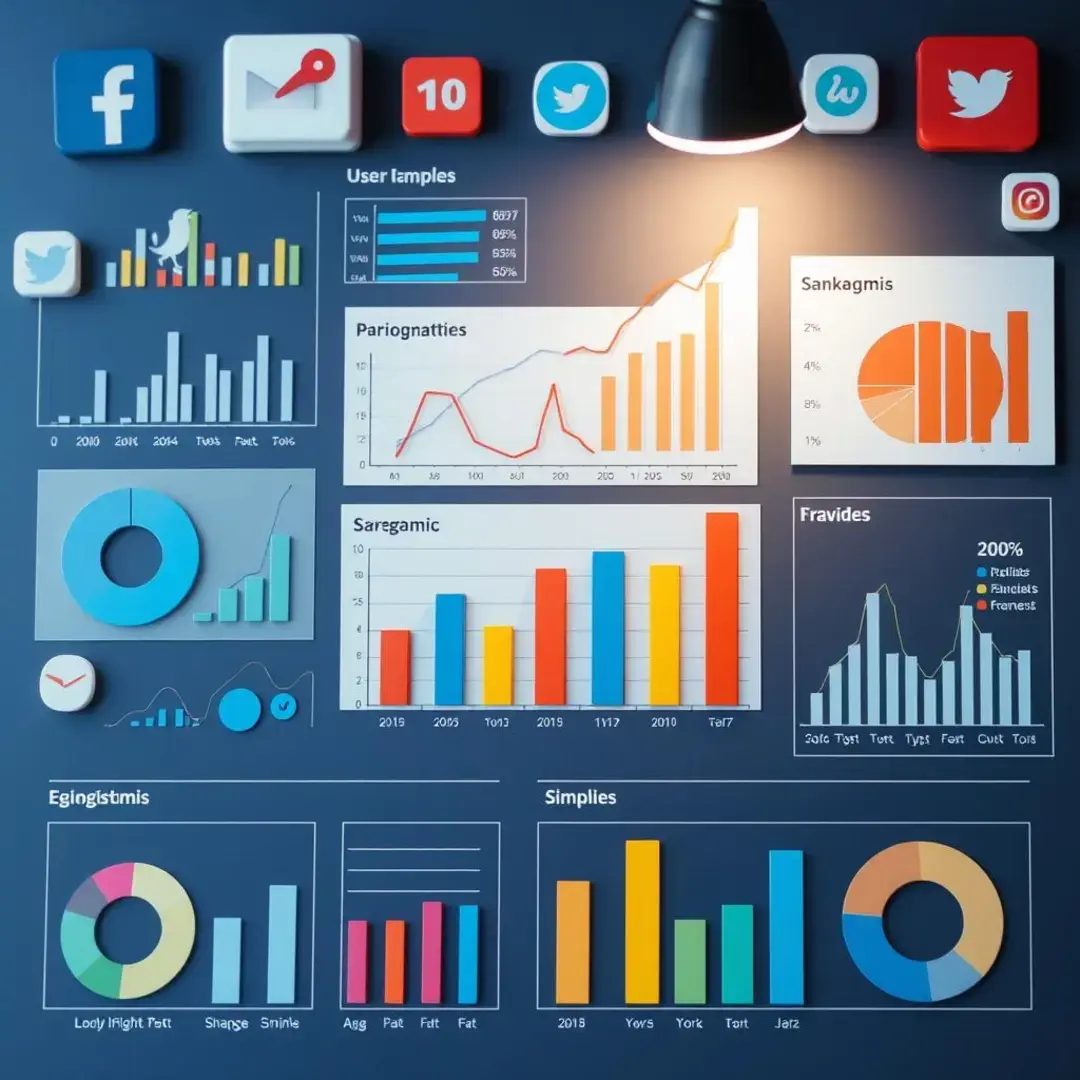Which social media platform has the most users?
Defining “most users”

Active users vs. registered accounts
When discussing social media user counts, it’s essential to differentiate between active users and registered accounts. Registered accounts merely signify the total number of individuals who have signed up for a platform, whereas active users reflect those who regularly engage with the service. This distinction is significant because it highlights platforms that maintain user interest and participation rather than just those that boast high sign-up rates.
A platform with a large number of registered users but low engagement may indicate potential issues with content quality, user satisfaction, or competition. Understanding these dynamics allows businesses to identify where to focus their marketing efforts effectively. In contrast, a platform with high active user rates typically indicates a vibrant community ripe for engagement opportunities.
Monthly active users (MAU) as a key metric
Another key measure often referenced is Monthly Active Users (MAU). MAU serves as a reliable statistic that reflects how many unique users engage with a platform during a given month. This metric is favored by marketers as it provides clearer insights into user retention and overall platform vitality, especially when planning campaigns or strategic partnerships.
Calculating MAU generally involves tracking the number of distinct users who log in or partake in activities on the platform within 30 days. This data can often be pulled directly from the platform’s backend systems, allowing companies and researchers to gauge the service’s performance accurately. Analyzing MAU data over time can provide invaluable insights into seasonal trends and user behavior fluctuations.
The top contenders

As one of the oldest and most established platforms, Facebook continues to lead the pack in user numbers. Owned by Meta, it boasts billions of active users globally, making it a powerhouse for digital marketing efforts. The platform’s age and familiarity appeal to a broad demographic, allowing it to maintain its status at the forefront of social networking.
Meta’s ecosystem extends beyond Facebook, incorporating platforms like Instagram and WhatsApp as well. This interconnectedness enables robust advertising capabilities, making it attractive for businesses targeting diverse audiences. Companies can leverage Facebook’s vast analytics to tailor their marketing strategies effectively.
Facebook’s user base is not uniform and varies significantly by region. While North America and Europe see high engagement rates, many users in developing nations are signing up as internet access expands, suggesting ongoing growth potential. Understanding geographic distribution aids businesses in crafting localized content and advertisements that resonate with specific audiences.
YouTube
YouTube stands as the second-largest social media platform globally, primarily notable for its video content. As a Google product, YouTube has a vast audience base, drawing in billions of monthly logged-in users. Its focus on video opens up new content marketing avenues for brands, allowing for creative storytelling beyond static ads.
YouTube’s integration into Google services extends its reach even further, facilitating content discovery through Google’s powerful search algorithms. This leverage helps marketers tap into video marketing trends and engage users more effectively. Over time, businesses harnessing this platform have witnessed notable engagement boosts through appealing visual content.
The demographic landscape of YouTube is diverse, with content appealing to various age groups. However, the younger generation, particularly Gen Z and Millennials, form the platform’s core audience. This shift toward younger users indicates opportunities for brands targeting this demographic with engaging video strategies.
WhatsApp features seamlessly in discussions around social media platforms, primarily as a messaging giant. With billions of users engaged in daily conversations, it stands out as a unique player in the industry, often transcending typical social media functionalities. Its emphasis on encrypted messaging creates a secure environment, appealing to privacy-conscious users.
WhatsApp’s accessibility further broadens its user base, as it operates on basic mobile devices and can function without extensive data. This versatility enables users in emerging markets to communicate freely, fostering significant adoption. For businesses, this platform offers opportunities for direct customer engagement through personalized communication channels.
Despite its success, WhatsApp has faced scrutiny regarding user privacy, especially after policy updates causing widespread concerns among its user base. While this led to an initial surge in users migrating to alternatives, WhatsApp has worked to reassure users with emphasis on data protection. Balancing user privacy while ensuring growth presents ongoing challenges for the platform.
Instagram has rapidly emerged as a quintessential platform for visual-centric content, appealing particularly to younger demographics. Owned by Meta, it capitalizes on the influencer culture that dominates the modern digital landscape. Brands utilize Instagram for impactful visual storytelling, connecting with users in a space that prioritizes engagement through imagery and videos.
The platform’s features such as stories, reels, and IGTV have successfully attracted diverse user interactions, creating opportunities for users to express themselves. Its design encourages creativity, facilitating a unique community where users share experiences visually. This shift in how brands communicate with followers shapes marketing strategies moving forward.
Moreover, Instagram thrives on influencer marketing, allowing brands to tap into pre-existing audiences curated by popular figures. Influencers create organic engagement, enhancing brand awareness and driving conversion rates. As a result, businesses are encouraged to leverage this burgeoning influencer culture for optimal marketing efficacy.
WeChat commands a massive user base in China, characterized as a super app that integrates messaging, social media, and more into one seamless experience. Its multifunctionality allows users to pay bills, communicate with friends, and engage with businesses from one platform. While its influence is immense within China, WeChat’s global reach remains limited in comparison to other platforms.
The platform’s success is supported by China’s robust digital ecosystem, coupled with a user-friendly interface that appeals to diverse age brackets. Businesses within China have capitalized on WeChat’s features to create an engaging customer experience, blending social media practices with commerce seamlessly. Therefore, understanding this platform is crucial for marketers focused on that market.
Unfortunately, WeChat’s effectiveness outside of China is constrained due to varying user preferences and alternatives being prevalent. It highlights the importance of recognizing cultural differences when approaching social media marketing strategically. As enterprises look to international markets, adapting to local preferences will be vital.
Factors influencing user growth

Accessibility and internet penetration
The growth of social media platforms is intrinsically linked to accessibility and internet penetration. As mobile devices become more widespread and affordable, more users gain access to social media. In regions with previously limited internet connectivity, particularly in developing countries, the surge in mobile internet users presents incredible opportunities for social platforms looking to expand their user bases.
Mobile devices allow users to connect anywhere and anytime, creating a seamless user experience. Social media platforms must continue evolving their mobile interfaces to cater to this growing audience. The role of mobile technology in bridging the digital divide is increasingly significant as people in diverse areas access information and participate in global conversations.
Cultural relevance and localization
Platforms that continuously adapt to the cultural nuances of their audience significantly enhance their popularity. Localization is key for ensuring that content resonates well within various community frameworks. Given the diversity of global cultures, platforms must invest in strategies that foster relatability to retain and grow their user base.
Localization goes beyond translation; it also involves understanding local trends, interests, and behavioral patterns. This understanding allows social media platforms to deliver tailored services that meet the unique needs of different user groups. Brands that take the time to engage with local cultures foster deeper connections with their audience, demonstrating sensitivity to their preferences.
Emerging markets and future growth
Emerging markets represent a significant opportunity for social media growth as internet access becomes increasingly widespread. These regions are often bypassed by traditional media and may display a strong affinity for social media platforms. By investing resources into developing strategies targeted at emerging markets, platforms can stimulate further growth while diversifying their user base.
Nevertheless, entering these markets is not without its challenges. Factors such as regulatory hurdles, fierce competition, and varying consumer behavior can hinder growth. Thus, platforms must exercise adaptability and innovation to find solutions tailored to these unique market demands, ensuring sustainability and user engagement in the long term.
Analyzing platform demographics

Age and gender distribution
The demographics of users on various platforms can inform marketing strategies and product development. Each social media platform tends to attract different age groups and genders, providing insights about who engages with what content. For instance, platforms like Instagram are particularly appealing to younger users, while Facebook has a broader age range.
Advertising tools available on these platforms often allow marketers to target specific demographic segments effectively. This precision offers invaluable data for brands seeking to optimize their campaigns and maximize their reach and effectiveness. Understanding user demographics can also improve product offerings tailored to those specific user segments, enhancing overall satisfaction and loyalty.
User behavior and engagement
Engagement metrics such as likes, shares, comments, and time spent on platform significantly reflect user behavior. Brands should analyze these behaviors to understand how different demographics interact with content. Creating engaging content requires a nuanced understanding of these patterns and responding to them pragmatically in marketing campaigns.
Utilizing analytics tools allows brands to identify peak usage times and format preferences among their demographic. By aligning marketing efforts with these insights, companies can ensure their content ripples through engagement waves effectively. Tailoring content to fit user behavior patterns can drastically improve message reception and interaction levels.
The future of social media user growth

Predictions and trends
Looking ahead, various trends are poised to shape the future of social media user growth. The continual advancement of technology, combined with changing consumer preferences, drives these trends. As platforms evolve, users are likely to demand heightened interactivity, personalization, and immersive experiences that keep them engaged, compelling platforms to innovate relentlessly.
The emergence of the metaverse presents a new paradigm for social interaction, with implications for user growth and engagement. Social media may adapt into more immersive spaces where users can connect beyond traditional boundaries. As the metaverse matures, platforms willing to enter this new space could redefine the potential for user engagement and growth.
The role of artificial intelligence
Artificial intelligence (AI) will play a significant role in shaping user experiences on social media. AI algorithms can enhance content curation, offering personalized suggestions based on user behavior and preferences. As the technology advances, it is likely to streamline user interaction, contributing to a richer, more satisfying experience.
In the coming years, the demand for personalized content will likely intensify. Users expect platforms to provide tailored experiences reflecting their interests and needs. Businesses that can leverage AI to craft personalized campaigns may engage effectively with their audience, driving higher retention and conversions.












